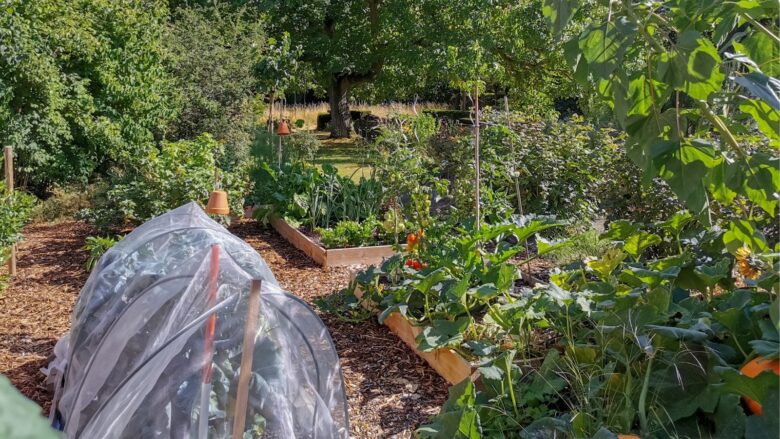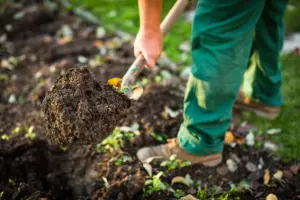The term “permaculture” is derived from “permanent agriculture” and refers to the concept of living in peace with nature rather than just a method of gardening. The goal of this horticultural technique is to replicate the resilience, diversity and efficiency of natural ecosystems in a cultivated environment. It is an approach that emphasises ingenuity, sustainability and the interconnectedness of all living things. This article discusses four key benefits of implementing permaculture principles in your garden, illustrating how this approach can transform not only your garden but also your lifestyle and environment.
1. Environmental Protection and Sustainable Development:
Permaculture’s commitment to sustainability and environmental stewardship is its cornerstone. Compared to conventional gardening, which often uses chemical fertilisers, pesticides and non-renewable resources, permaculture gardening places a strong emphasis on the use of natural materials, renewable resources and a smaller ecological impact. This method helps:
Water Conservation: Permaculture designs include rainwater harvesting, drip irrigation and other water-saving techniques to reduce dependence on external water sources and protect this precious resource.
Maintain Healthier Soil: Permaculture gardens naturally increase soil fertility through mulching, composting and polyculture. This eliminates the need for artificial fertilisers, which can have a negative impact on the environment.
Promote Biodiversity: By providing a variety of habitats and using a variety of plant species, permaculture gardens create a healthy ecosystem that supports beneficial insects, birds and other animals.
2. Nutrition and Food Security:
With permaculture gardening, you can find a resilient and sustainable food source on your doorstep. Gardeners can harvest a variety of fruits, vegetables, herbs and nuts year-round by incorporating annual and perennial varieties into their plant collections and mixing them together. This ensures a steady supply of fresh vegetables and adds nutrients to a balanced diet. Additionally, permaculture techniques such as companion planting and organic pest control can keep gardens productive and healthy without the use of artificial pesticides, resulting in cleaner and healthier food.
3. Reduce Waste and Improve Resource Use:
One of the most important principles of permaculture is ‘zero waste’. This way of thinking promotes the efficient use of resources and the recycling or composting of organic materials. Nothing in a permaculture garden goes to waste. Compost is made from leaves, twigs and food scraps to enrich the soil. Preference is given to natural materials for the construction and cladding of the garden and, where possible, water is retained and recycled. This not only reduces the garden’s impact on the environment, but also significantly saves on water, waste disposal and garden supplies.
4. Improve Health and Community Relations:
Permaculture gardening can have a significant impact on a person’s well-being. In addition to providing physical activity, stress relief, and a sense of accomplishment, gardening is also a therapeutic activity. With an emphasis on biodiversity and natural beauty, permaculture gardens can be developed into peaceful retreats where people can relax and find inspiration. Permaculture also often promotes a sense of community. When neighbours exchange additional produce, seeds and gardening advice, strong relationships can be fostered and local food security can be supported. Permaculture practices in communities can revitalise public spaces, increase environmental awareness, and build thriving, sustainable communities.
Conclusion:
Permaculture is an integrated approach to food production that promotes resource efficiency, food security, environmental sustainability and improved well-being. By harmonising gardening techniques with natural principles, permaculture gardeners create productive ecosystems that are good for the earth and themselves. No matter how big or small your backyard is, adopting permaculture concepts can improve your gardening and make the world a better, more sustainable place.
Embrace the ideas of permaculture in your garden and see how your outdoor space can become a vibrant ecosystem that nourishes the body and mind. Your garden is the first step towards a sustainable lifestyle
FAQs:
1. What is permaculture gardening?
Permaculture gardening is a gardening method that aims to create a sustainable and self-sustaining ecosystem. It mimics natural ecosystems and focuses on the diversity, sustainability and interdependence of all living things. This approach integrates the garden with its environment, producing food, reducing waste and promoting a healthy ecosystem.
2. How do you save water with permaculture gardening?
Permaculture gardening conserves water through various techniques, such as rainwater harvesting, the use of drip irrigation systems and mulching. These practices help retain soil moisture, reduce evaporation and make the most of existing rainfall, minimising the need for additional water.
3. Can permaculture gardening improve food security?
Yes, permaculture gardening significantly improves food security by providing a diverse and resilient source of fruits, vegetables, herbs and nuts all year round. The variety of plants grown and the mix of perennial and annual species ensure a constant supply of fresh produce, contributing to a balanced and nutritious diet.
4. What does ‘zero waste’ mean in permaculture gardening?
‘Zero waste’ is the principle of permaculture, which emphasises the efficient use of resources and the recycling or composting of organic material. In a permaculture garden, waste materials such as leaves, twigs and kitchen scraps are composted and returned to the soil as nutrients, while water and natural materials are used and reused efficiently, minimising the garden’s ecological footprint.
5. How does permaculture gardening benefit personal well-being and community connections?
Permaculture gardening provides therapeutic benefits through physical exercise, stress reduction and the pleasure of growing plants. It also enhances personal well-being by providing a tranquil and biodiverse space for relaxation and inspiration. Additionally, permaculture encourages community involvement by sharing surplus produce, seeds and garden knowledge, fostering strong community ties and supporting local food security initiatives.



